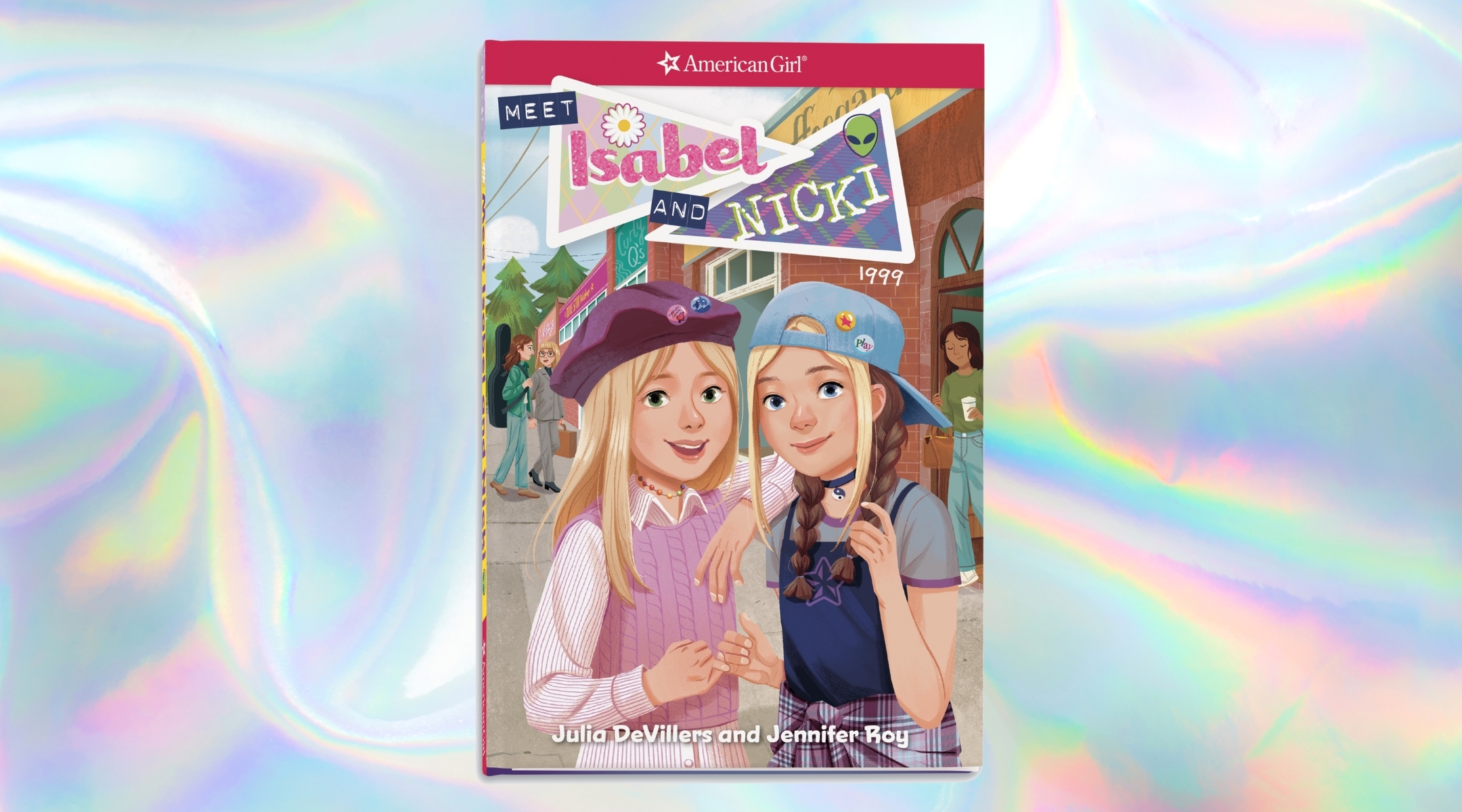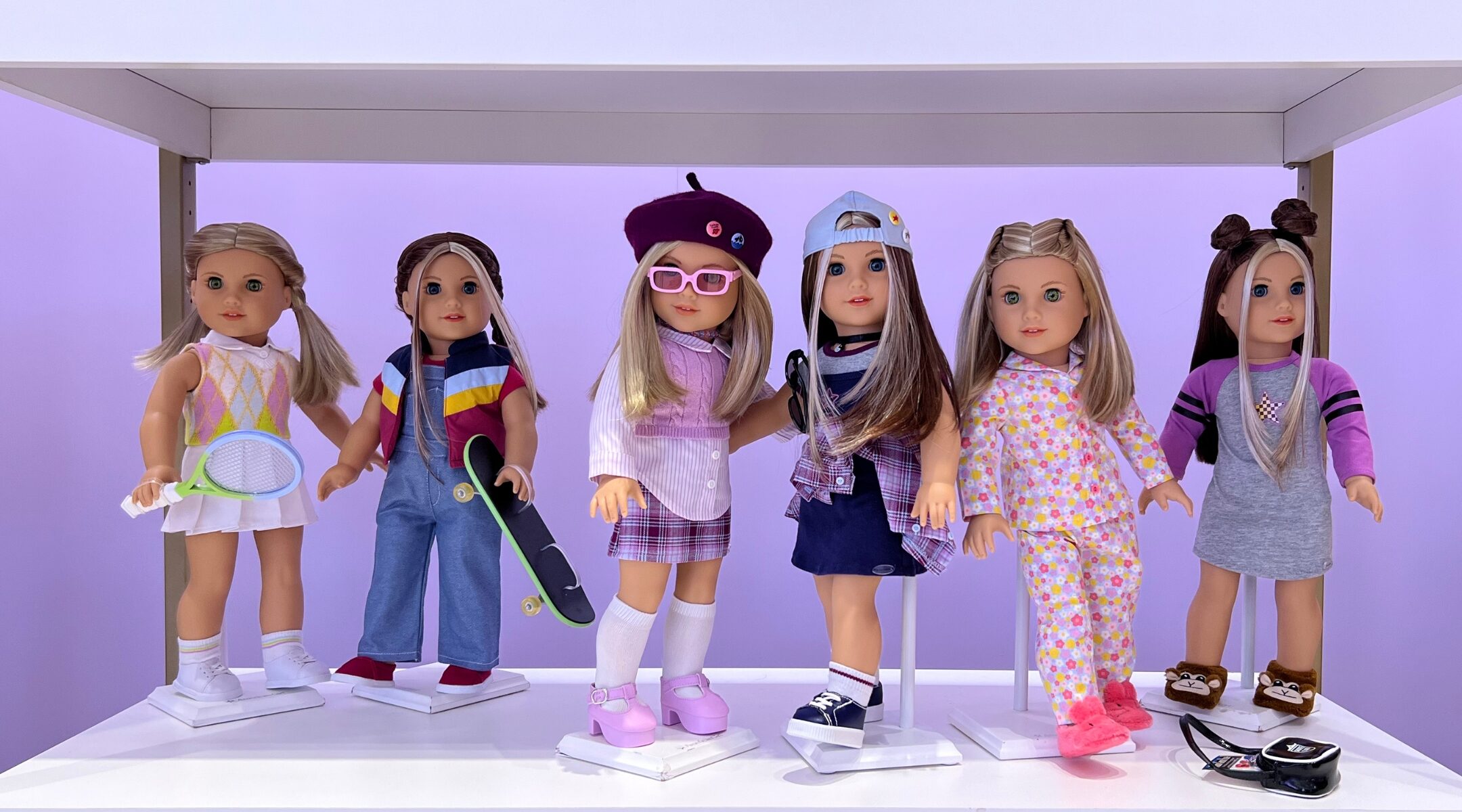(JTA) — As children in upstate New York, twin sisters Julia DeVillers and Jennifer Roy went to Hebrew school three days a week, spent their summers at a JCC summer camp and got to know local Holocaust survivors through their father, who survived the Nazis as a child in Poland. They also celebrated Christmas with their mother’s family.
Aware of their dual religious and cultural backgrounds from a young age, DeVillers and Roy personally sent their public elementary school principal a letter asking to place a menorah next to the school Christmas tree. The girls gathered a couple of the other Jewish students together to present the letter to the principal, to resounding success: A real menorah was added to the school’s holiday display.
It was something straight out of an American Girl story. And as of this week, in a sense, it is one.
On Wednesday, American Girl released its first twin dolls, Isabel and Nicki Hoffman, who are also the first characters from an interfaith family. Their stories take place in the late 1990s and were written by DeVillers and Roy, inspired by the sisters’ own childhood experiences. The twin dolls’ parents are, respectively, Jewish and Christian, and their mother, Robin, is named after the authors’ own mother.
“It’s incredibly special to us that the twins bring this Jewish and interfaith representation that so many kids will relate to,” DeVillers told the Jewish Telegraphic Agency.
Roy added, “People are not necessarily one thing or another these days. And while we are Jewish, we did grow up with both holidays and both cultures in our family. And that’s how we wanted our characters to be and to feel.”

Isabel and Nicki’s stories are loosely based on the childhood experiences of authors and real-life twins Julia DeVillers and Jennifer Roy. (Courtesy of American Girl)
The dolls are a milestone in how the lived experience of many American Jews is reflected in popular culture. Recent surveys of Jewish Americans consistently note high rates of interfaith marriage, and show that a significant portion of those couples raise their children either fully or partly Jewish.
Isabel and Nicki are the second and third historical Jewish American Girl dolls, joining Rebecca Rubin. Rebecca’s story reflected an earlier generation’s perception of normative American Jewish identity: Her family immigrated from Russia and lives in New York’s Lower East Side in 1914, while navigating issues of assimilation and religion.
Stories of joint Hanukkah-Christmas celebrations are not exactly new. A TV episode Isabel and Nicki’s character’s might have watched as teenagers, “The Best Chrismukkah Ever” from the drama “The O.C.,” aired nearly two decades ago. But the dolls and their stories are “super innovative and relevant for 21st-century Jewish interfaith families,” said Keren McGinity, the interfaith specialist for the Conservative movement of Judaism and a professor of American studies at Brandeis University.
“Anytime there’s cultural representation that depicts real life, it’s a good thing,” McGinity said, though she added that some depictions of interfaith families are more robust than others.
“On the one hand, it’s terrific that they’re reflecting contemporary American Jewish life by depicting an interfaith family through these characters and reinforcing the fact that it only takes one Jewish parent to raise Jewish children,” she added. “And it remains to be seen how they are Jewish beyond celebrating the December holidays, and how they’re interfaith beyond celebrating the December holidays, plural.”
The new twin dolls are the latest in American Girl’s iconic series of dolls, which hail from different eras of American history and come with novels about their lives. American Girl has historically aimed to present a diverse set of dolls. Other recent offerings include Evette Peeters, a biracial girl who cares for the environment, and Kavi Sharma, an Indian-American girl who loves Broadway musicals.
The new historical characters, Isabel and Nicki, retail for $115 each. Their stories are written by DeVillers and Roy, respectively, and begin on Dec. 11, 1999, when they receive their journals as a gift for the last night of Hanukkah.
They have their own distinct personalities, which the authors say somewhat resemble what they were like as kids: Isabel has a preppy style and loves dancing, and is advertised wearing a pink cable-knit sleeveless sweater over a pinstripe shirt, with a plaid skirt, platform shoes and a beret. Nicki likes skateboarding and writing song lyrics, and appears on the American Girl website wearing a backwards baseball cap, choker necklace, blue T-shirt dress and sneakers, with a flannel shirt tied around her waist.
Isabel’s book begins with a nod to a late-1990s fad: “Hi, New Journal! You’re my present for the last night of Hanukkah!! I was going to save you for after Christmas and New Year’s, but we also got NEW GEL PENS!”
In Nicki’s book, her interfaith identity is mentioned two weeks later: “Did I mention my family celebrates Hanukkah AND Christmas? Well, we do.”
The two journals, “Meet Isabel” and “Meet Nicki” are filled with text and sold with the dolls. The stories take place during the same time frame, as the girls celebrate the winter holidays, face their fears, make new friends and worry about Y2K. A longer novel, “Meet Isabel and Nicki” is set for release in August as the first in the Isabel and Nicki historical series. It will take place during the same month as the shorter journals, but will delve further into the time period. Readers will get to spend the last night of Hanukkah with the Hoffmans, lighting the menorah and playing dreidel.

“Meet Isabel and Nicki,” the first novel in the series about the Hoffman twins, will be released in August. (Photo courtesy of American Girl. Design by Jackie Hajdenberg)
McGinity said she would have to wait until the new book comes out to see what the girls’ representation looks like, given that the journals are so short.
“I feel like we don’t have enough intel other than ‘OK, the authors are Jewish, the characters are Jewish, they grew up in an interfaith household,’” she added.
The crowded flagship American Girl store in New York City has already begun promoting Isabel and Nicki by showcasing the twins’ different outfits and bedroom and accessory collections, with dozens of the dolls positioned throughout the store.
“While we’re not able to provide specific sales information, I can say we’ve been happy to see the positive response for the new characters,” a representative for the company said.
Roy and her sister have previously written a series of children’s novels about twins, and Roy also authored “Yellow Star,” a 2006 children’s book about her aunt’s remarkable survival as one of the only children to be liberated from the Lodz Ghetto. Roy said she and her sister are grateful for the chance to tell their family’s story in a new way.
“So we don’t know what cultures, faiths, religions are coming beyond this,” said Roy, referring to future American Girl products. “But what we did know was that if we were writing in the holiday season, we really wanted to include parts of ourselves and that’s what American Girl editors all said: ‘We’d love to have you remember from your childhood.’ And this was our childhood.”
JTA has documented Jewish history in real-time for over a century. Keep our journalism strong by joining us in supporting independent, award-winning reporting.






